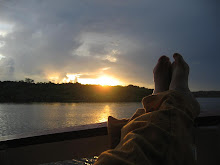 Now that I got you to click through to the whole article, let me take a step back; not in substance (the title is technically true) but in tone. In spite of the fact that the decision I am referring to really won't do anything what-so-ever for our current bankrupt fisheries, it is still a very important step. That decision is the announcement yesterday by U.S. Secretary of Commerce Gary Locke to prohibit the expansion of commercial fishing in federal Arctic waters until researchers gather sufficient information on fish and the Arctic marine environment to prevent adverse impacts of commercial harvesting activity on the ecosystem.
Now that I got you to click through to the whole article, let me take a step back; not in substance (the title is technically true) but in tone. In spite of the fact that the decision I am referring to really won't do anything what-so-ever for our current bankrupt fisheries, it is still a very important step. That decision is the announcement yesterday by U.S. Secretary of Commerce Gary Locke to prohibit the expansion of commercial fishing in federal Arctic waters until researchers gather sufficient information on fish and the Arctic marine environment to prevent adverse impacts of commercial harvesting activity on the ecosystem. That may sound a bit wonky, so let me break it down. Basically, we all know that the ice caps are slowly melting. We know that there is currently a race in which all nations with land bordering the arctic are staking claims to the various natural resources believed to be locked up underneath all that ice. We also know that there is currently a boatload (read: many many boatloads, pun intended) of money being made by large fishing companies around the world, and that these same fishing practices are driving our fish populations and ocean ecosystems to near collapse. What you (dear reader) may not know is that when it comes to sustainable fishery management, the US is actually (for once!) a real thought leader, and that the announcement above is a reflection of that. Essentially, the US just announced that it will absolutely prohibit any commercial fishing in US arctic waters until AFTER the science dictates the most sustainable way to go about it.
T
 he plan approved will prohibit commercial fishing in a huge swath of American waters in the Arctic that have never been fished and that nobody currently wants to fish (hence the snark in my title). HOWEVER, in reality this is a very smart move because the rapid melting of Arctic sea ice caused by climate change will someday make the area more accessible and more commercially more attractive, not just to oil interests, but to fishing interests as well.
he plan approved will prohibit commercial fishing in a huge swath of American waters in the Arctic that have never been fished and that nobody currently wants to fish (hence the snark in my title). HOWEVER, in reality this is a very smart move because the rapid melting of Arctic sea ice caused by climate change will someday make the area more accessible and more commercially more attractive, not just to oil interests, but to fishing interests as well. The plan was developed by environmentalists and the Marine Conservation Alliance, the same group that turned Alaska from a sustainable fishing nightmare in the and 50's into the model of sustainability it is today. (As I said before, fishery management is one of the few environmental areas where the US is really a thought leader: Alaska is currently recognized as one of the worlds leading sustainable fisheries and even has a theory of fishery management named after it. More on this in another post).
In spite of this announcement, the reality is that no one knows where the borders may eventually be drawn in the arctic so there is a good chance that at least some, if not all, of the area the US wishes to protect may not be within our jurisdiction. However, this announcement is symbolic in addition to practical -- the US has signaled (finally!) that it is willing to engage unilaterally in a sustainability agreement - something it has avoided doing elsewhere, most notably on climate change itself. Hopefully, this announcement will send a signal to the other Arctic nations -- including Russia, Canada, Norway and Denmark-- that while there may be an economic opportunity for fishing newly uncovered areas of ocean, it must be done in a sustainable way.
Top image provided by Alan Vernon




No comments:
Post a Comment